The Most Venerable Master Hsing Yun
The Most Venerable Master Hsing Yun was born in 1927 in Yangzhou, Jiangsu province, China. He was tonsured when he was 12 years old. Later he went on to receive formal monastic training at Qixia Vinaya School. He is the 48th generation lineage holder of the Linji Chan (Rinzai Zen) School through Master Zhi Kai, his teacher. In 1949 he organised a monk rescue team and headed for Taiwan, spreading the light of Buddhist wisdom to the other side of the strait. In the early years after his arrival in Taiwan, Master Hsing Yun mainly propagated Buddhism in Ilan. In 1967 he founded the Fo Guang Shan Monastery, beginning to promote the “Humanistic Buddhism” philosophy. He dedicates himself whole-heartedly to advancing Buddhist education, culture, charity and the propagation of Buddhist teachings, in an attempt to realise his ideal, “Let the whole world be bathed in the light of Buddhist wisdom and the nourishing water of Buddhist teachings.” His outstanding contributions to the religious and cultural worlds have earned him numerous international awards and honours.
He has received honorary doctorates from more than ten universities, including the University of Macau. He has authored more than 30 books which have been translated into many different languages.
On 21 January 2013, the University of Macau (UM) held an honorary degree conferment ceremony for Master Hsing Yun in Fo Guang Shan, Taiwan. Dr. Daniel Tse Chi Wai, chair of UM’s University Council, conferred a Degree of Doctor of Humanities honoris causa upon Master Hsing Yun, on behalf of Chui Sai On, chief executive of Macao SAR and chancellor of UM. Lei Pui Lam, chair of UM’s Honorary Degrees and Titles Committee; Wei Zhao, rector of UM; Haydn Chen, vice rector (student affairs) of UM; Hao Yufan, dean of UM’s Faculty of Social Sciences and Humanities; Paul Pang, registrar of UM; as well as guests and Master Hsing Yun’s disciples from around the world, witnessed the ceremony. At the ceremony, UM presented to Master Hsing Yun three scrolls of calligraphy works by UM staff and students as souvenirs, and in return Master Hsing Yun presented a Zisha teapot set to Dr. Tse, an alms bowl to Lei Pui Lam, and his calligraphy work “Anuttara” to Rector Wei Zhao. He explained that “Anuttara” means “the unsurpassed one”, and said that he wished to convey through the calligraphy work his hope that UM could continue to fulfill its role to educate people and to nurture unsurpassed graduates for society.
Master Hsing Yun stressed at the ceremony, “I never went to school, but the world—our society—is a university. Doing one’s best to serve the world is practicing the universal law. The fact that UM conferred this honorary degree on me shows that there is no one way to attain achievements in life. All roads lead to Rome.” Education is an effective means of helping people to become better and kinder. But education doesn’t have to be limited to the classroom, especially in today’s complicated and fast-changing world, where the temptation of fortune and fame constantly causes turmoil in people’s hearts and makes them lose their direction. What wisdom can Buddhist teachings offer us? Let’s hear what Master Hsing Yun has to say.
J: Journalist M: Master Hsing Yun
J: How can we live a happy and carefree life?
M: Our heart is like a factory. This factory can produce joy. It can also produce worry. If you can produce worry to make yourself unhappy, why don’t you produce joy instead? Many of our worries are much ado about nothing.
J: What do you mean by “To gain one has to give first”?
M: If you have a rice field, you have to give it your labour before you gain harvest from it. If you want to eat, you have to cook first. You reap what you sow. If you want to gain something, you have to give first. If you are a cheapskate and never help those in need, how can you expect others to help you when you are in need? To gain and to give are two sides of the same coin.
J: What’s your definition of “poor” and “rich”?
M: I don’t think “poor” or “rich” should be defined by how much money one has. People with money are not necessarily rich. Some suffer from moral bankruptcy. In my opinion, the world is filled with poor people with money. How so? Because they don’t sow. They are not willing to think about others. Some people, even though they’re without money, they often help others. These people are rich. My personal philosophy is: Not having is the best state to have, and cultivating a big heart is the way to have lasting inner joy. By worldly definition, you could say I’m very “poor”, but Fo Guang Shan Monastery as a big family is “rich”—we have the good fortune to have received generous support from a lot of people. But the riches don’t belong to me. They belong to everyone, and that’s what matters.
J: Why do you value education so much?
M: Because education can change a person—from within. It helps one grow morally, spiritually and intellectually. Education has a considerable bearing on one’s life, and it is a lifelong process. When we are young, parents educate us. Later schools fill that role. After we graduate from college and start work, good friends become our teachers. I never went to school, but I have been educated by the world, by society and by Buddhist temples. Confucius once famously said, “In a group of three people, there’s always someone I can learn from.” So I consider every time spent with other people a chance to learn something.
J: How can we help today’s young people to use Buddhist teachings to benefit their lives?
M: It’s not that easy. First of all you have to learn Buddhist teachings, but just because you can quote some Buddhist terms doesn’t mean you have truly understood Buddhist teachings. You need to work hard, to dig deep, to ruminate until you fully digest the essence. You also need epiphany. Only when you have come to your own hard-earned understanding of the teachings and internalised them can you truly benefit from them.
J: How do you think young people should improve their personal qualities?
M: Exposure to an appropriate amount of hardship is healthy for one’s growth. Parents should not spoil their children if they want their children to grow up to be resilient. Nor should young people spoil themselves. There is an ancient Chinese poem that describes the life of limestone. The raw limestone endures thousands of strikes to be dug out of the deep mountain, after which it is burned in scorching flames without ever flinching and then ground to dust without ever complaining, just so it can fulfill its destiny to become lime. If one wants to make his or her mark in the world, he or she must be able to withstand hardships like raw limestone. Young people nowadays are referred to as the “strawberry generation”, which means they lack spiritual vitality and a sense of mission and tend not to give much thought to personal growth or what they want to achieve in their lives. Endurance, wisdom, benevolence, responsibility and confidence—these are the qualities which give us strength and which we should work to possess.
J: How can one achieve something meaningful in life?
M: First of all you need to foster good habits. Then you need to have a sound mind. You also need to be polite, have a sense of mission, be diligent, have a sense of proportion, and know when to stop and when to persevere. If you want to go anywhere in life, you need to be your own guardian angel. Of course it’d be great if other people are willing to lend us a helping hand, but at the end of the day it’s your own help and guidance that matter the most.
J: Many people nowadays harbour resentment about a lot of things in life. How do you suggest that they should do to remove the resentment from their heart?
M: If you have resentment in your heart, you’ve only got yourself to blame. If you could understand it’s not any outside thing but your own attachment or greed that causes the resentment in the first place, you would be able to let go of the emotion. If you have time to be angry, you might as well use that time to do something good for society, right?
J: Tell us about the Three Good’s Movement you initiated in Taiwan.
M: He refuses to say just a few nice words even though he knows these words would have been enough to help a person. He assumes the worst in other people even when he has the choice to think otherwise. Such is the ingrained weakness of man. The Three Good’s Movement asks people to do good deeds, say good words, and harbour good wishes and intentions. The “three good’s” cleanse a person’s mind of three poisons, turning ruthlessness and cruelty into peace and kindness, jealousy into compliments, greed into generosity, ugly into clean.
J: Which people or experiences have had the greatest influence on your life ?
M: I believe in the Shakyamuni Buddha. His thoughts and his benevolence have had a profound influence on me. I also believe in Master Taisyu. His passion for service, his commitment to public welfare, and his promotion of the Buddhist concept of equality have also had a deep influence on me. I also deeply respect Sun Yat-sen and Deng Xiaoping. The former’s ideology that, “The world as a commonwealth shared by all,” and his Three Principles of the People [otherwise known as San-min Doctrine], and the latter’s “reform and opening-up” policy have had a big impact on me.
J: You once mentioned that you hope Macao can become a world centre for Buddhist studies. Can you elaborate a little bit?
M: Macao is geographically close to mainland China, and mainland culture can be seen everywhere in Macao. Macao also has an over-400-year-history of Chinese and western cultures interacting with each other. Christianity and Catholicism also have a large following in Macao. Macao is a mix of eastern and western cultures, and I hope that Macao could make use of this unique advantage to develop into a world centre for religious studies where there is no man-made differentiation between religions, where equality among all people and religious traditions can prevail.
All his life, Master Hsing Yun has never let a lack of material possessions to stop him from pursuing his beliefs. His philosophy that, “Not having is the best state to have and cultivating a big heart is the way to have lasting inner joy,” as well as his tireless promotion of the “Humanistic Buddhism” philosophy, have earned him widespread respect both at home and abroad. Despite his failing health in recent years, Master Hsing Yun still does homework with his disciples every day. He said, “To live life with a purpose, one must have self-imposed morning and night homework sessions in addition to daily work. For instance, my morning homework is reading books and chanting the Buddhist scriptures. My night homework is writing, reviewing the day, or planning for the future.” Master Hsing Yun practices what he preaches. For more than seven decades, he has never stopped writing or learning. His diligence and perseverance set a brilliant example for us.
Postscript:
“Spring is not so much a season as a state of mind.” “Read good books to make yourself happy. Do good deeds to make others happy.” “Don’t radiate resentment. Radiate friendliness.” “Don’t be mad. Be motivated!” In Fo Guang Shan Monastery, Kaohsiung, Taiwan, Master Hsing Yun’s quotes of wisdom can be seen everywhere. Many followers of Master Hsing Yun visit the monastery to practice Buddhism. A large group of volunteers from different parts of the world also serve here with all their hearts. Master Hsing Yun’s disciples who received us were all very friendly and kind. Asked why they chose to follow Master Hsing Yun, they answered, “Master never gets angry. He’s always easy-going, fun, kind, full of wisdom and full of love for life. His heart is filled with joy. Everyone, regardless of their age, wants to be around him. We feel very fortunate to study with him.” A volunteer who has been driving a sightseeing bus in Fo Guang Shan Monastery since his retirement said, “Being able to serve here is itself a blessing!”.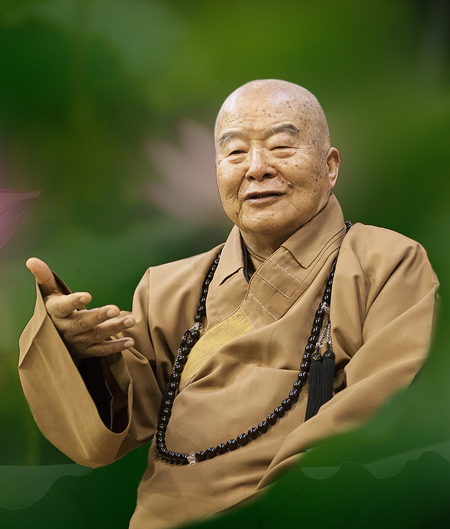
Master Hsing Yun
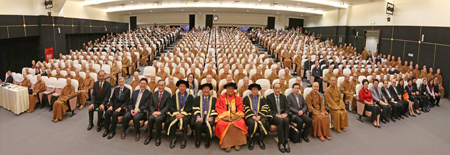
Guests and Master Hsing Yun’s students from around the world attend the honorary degree conferment ceremony
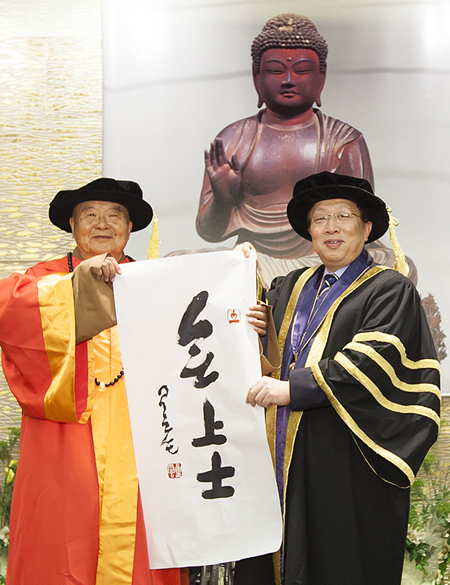
Master Hsing Yun presents his calligraphy work “Anuttara” to Rector Wei Zhao
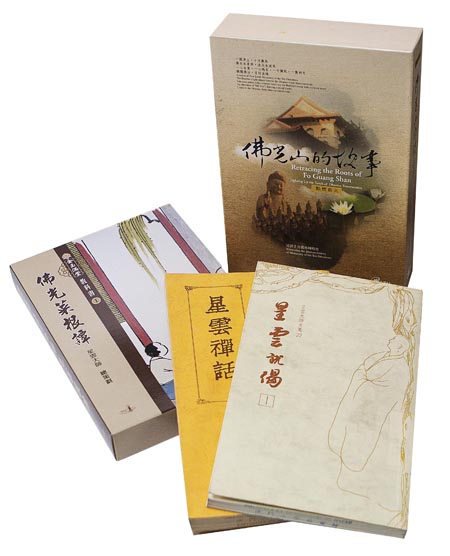
Master Hsing Yun promotes “Humanisitic Buddhism” and has authored more than 30 books
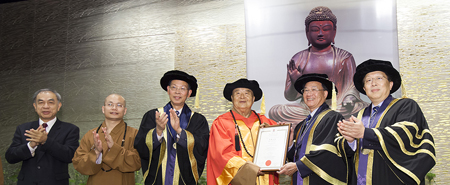
UM’s University Council Chair Dr. Daniel Tse Chi Wai (2nd from right)
